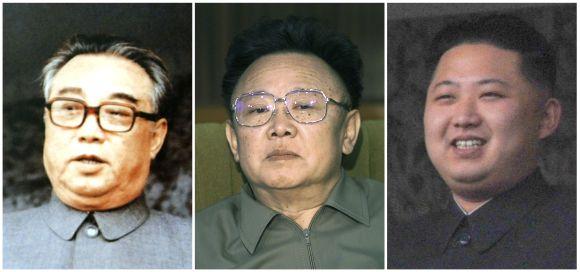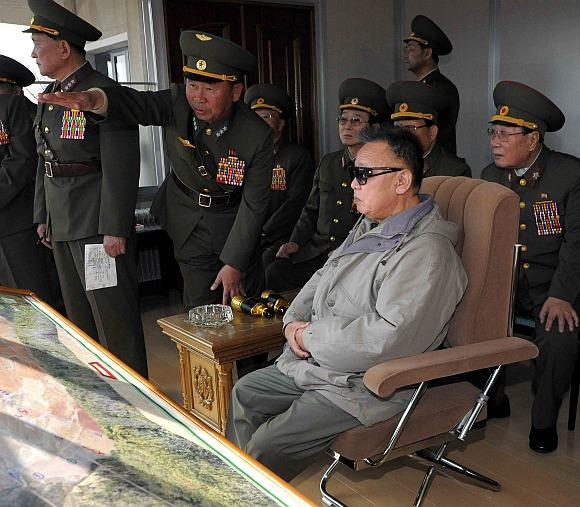
The death of Korean leader Kim Jong-il has brought nuclear North Korea into the spotlight. The country today is desperately poor and heavily reliant on aid from China.
Kim Jong-il death has raised fears of upheaval in the nuclear-armed nation and all eyes are on his youngest son, Kim Jong-Un, who was declared as the country's next leader. However, he remains a mystery as not much is known about him.
Rediff.com takes a look at the dictatorial journey of the Kims – from 'The Great Leader' to the 'Dear Leader', and what little is known about the 'Great Successor'.
Kim Il-Sung
Known as "the great leader," the father of communist North Korea, Kim Il Sung, was born in Korea in 1912.
He was the nation's premier from 1948 to 1972, chairman of its dominant Korean Workers (Communist) Party from 1949, and president and head of state from 1972.
In 1925, Kim Il Sung fled to Manchuria to escape the Japanese rule of Korea, where he attended a Chinese school. He was arrested and imprisoned at the age of fifteen for being a member of the South Manchurian Communist Youth League.
Kim Il Sung later joined the Korean Revolutionary Army in 1930 and became the leader of a guerrilla group based in Korea. Kim returned to Korea during World War II and established a communist government in 1948.
Hoping to reunify Korea by force, Kim launched an invasion of South Korea in 1950, thereby igniting the Korean War. His attempt to extend his rule there was repelled by United States troops and other UN forces.
Kim ruled North Korea with a brutal iron fist. He introduced a philosophy of juche, or "self-reliance," under which North Korea tried to develop its economy with little or no help from foreign countries.
While retaining control of the Korean Workers' Party, Kim Il-sung relinquished the office of premier and was elected president of North Korea in December 1972.
In 1980 he raised his eldest son, Kim Jong Il, to high posts in the party and the military, in effect designating the younger Kim as his heir.
In June 1994, United States President Jimmy Carter persuaded Kim Il-Sung to freeze his nuclear development programme in exchange for an ease in international sanctions.
Kim IL Sung died on 8th July, 1994. Kim Il-sung was given the posthumous title of president for life.
...

Kim Jong-il led communist North Korea since the death of his father Kim Il-Sung in 1994.
As supreme leader of North Korea, Kim Jong-il built one of the world's largest standing armies. However, around two million people have died since the mid-1990s as a result of food shortages owing to economic mismanagement in the country.
The official biography of the leader states that he was born in a secret military camp on Baekdu Mountain in Japanese Korea on 16 February, 1942.
Kim Jong-il family later moved into a former Japanese officer's mansion in Pyongyang.
Throughout his schooling, Kim Jong-il is said to have been involved in politics. Kim is also said to have received English language education at the University of Malta in the early 1970s.
Kim Jong-il's was given senior posts in the politburo, the Military Commission and the party Secretariat. And when he was made a member of the Seventh Supreme People's Assembly in February 1982, international observers deemed him the heir apparent of North Korea.
On 24 December, 1991, Kim was also named supreme commander of the North Korean armed forces.
Since the Army is the foundation of power in North Korea, Defense Minister Oh Jin-wu, one of Kim Il-Sung's most loyal subordinates, engineered Kim Jong-il's acceptance by the Army as the next leader of North Korea, despite his lack of military service.
In 1992, Kim Il-sung publicly stated that his son was in charge of all internal affairs in the Democratic People's Republic.
For nearly 20 years, Kim defied and baffled international leaders with his isolated regime's nuclear ambition, inflammatory rhetoric and surprise attacks on South Korea, including the suspected March 2010 sinking of a Southern military ship and the bombing of Yeonpyeong, a South Korea-controlled island in November of that year.
In Kim Jong Il's regime, lakhs of dissenters were thrown into prisons and labour camps located in the countryside, and they are held under brutal conditions.
In September 2010, Kim Jong Il unveiled his third son, the twenty-something Kim Jong Un, as his successor, putting him in high-ranking posts.
Kim Jong Il, 70, died on December, 17 of a heart attack while on a domestic train trip.
...

Not much is known about the man expected to lead North Korea next. North Korean state media proclaimed the twenty-something Kim Jong-un as the "great successor".
The chubby-faced Kim Jong-un is said to have studied at an English-language school in Switzerland.
The country even claims that their next leader graduated from Kim Il Sung Military University. He was even made a four-star general in 2010, which took place during a meeting of the ruling Workers' Party -- the first time Jong-un appeared publicly.
Kim Jong-un also was given membership on the Central Committee of the party, and appointed vice chairman of the party's Central Military Committee, two important posts his father Kim Jong-il had overseen.
The international community will be keeping a close eye on developments in North Korea as it brings in its new leader. If Kim Jong-un fails resulting in a power struggle, North Korea will run into a turbulent situation.